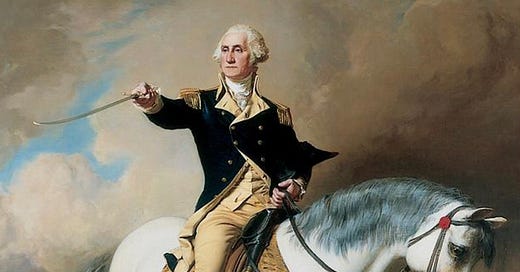The naked pretense for this authoritarian parade was always a farce. This was never about celebrating the U.S. Army’s birthday. It was about appeasing the fervid whims of a small man, playacting his militaristic tough-guy fantasies.
Lost in the bluster of endless coverage is any real consideration of the Army’s actual historical origins—and what they might tell us about our moment.
In May 1775, more than a year before they would issue the Declaration of Independence, the Second Continental Congress gathered in Philadelphia, in the wake of the shots fired at Lexington and Concord. The Revolutionary War had begun, and the question now was how the other colonies would respond to the tyranny of a king.
On June 14, the delegates resolved that “six companies of expert riflemen be immediately raised in Pennsylvania, two in Maryland, and two in Virginia... That each company, as soon as completed, shall march and join the army near Boston, to be there employed as light infantry, under the command of the chief Officer in that army.” And with that there was a Continental Army in the literal definition of the term. The next day, on June 15, George Washington was selected to lead it.
The formation of the U.S. Army was born out of crisis—an act of defiance against monarchical overreach. It was a gesture of unity and sacrifice, a belief—at great risk and cost to those now considered traitors to the Crown—that freedom was a cause worth risking everything for.
Of course, any honest discussion of this nation’s founding must also confront the deep injustices embedded within it. The system of government bequeathed to us by these very imperfect Founding Fathers has had to evolve—through struggle, protest, and untold bloodshed—to more fully live up to its stated ideals.
And that is the context for today. The strength of this nation is not measured in tanks or military hardware. We do not prove our might through soldiers marching on American streets—let alone deployed against local elected officials, or worse, against the people themselves.
Because it is we the people, as corny as it may sound, who make this country great. It is the freedoms and protections enshrined in our laws—however unevenly and imperfectly applied—that have given this nation its power and standing. It is our ideals that make the United States worthy of defending.
Washington, D.C. has seen a lot of history—and it’s a city infused with symbolism. So it was inevitable that this horrific parade would generate jarring juxtapositions and chilling hypocrisies. A route up Constitution Avenue for a man who swore an oath to uphold the document but feels unbounded by any restriction on his power. The shrines to our national heroes, like the Lincoln Memorial, serving as a backdrop for a corrupt and despotic regime that stokes division instead of unity. And then there is the city itself, a vibrant, diverse community having to cede civic life to a militaristic circus.
Our capital city was born out of compromise and founded for the express purpose of governing a young and fragile republic. It was named after the man who first led our army and later became our first president. Its grand circles and avenues, and the marbled edifices that have come to define its skyline, began as aspirations—much like the documents that outlined the powers of the people who gathered here to govern.
There was nothing preordained about what America would become. Washington did not live to see the federal government move to the District of Columbia. He could never have known what the city would grow into—or that the nation he helped bring into being would emerge as the most powerful country on earth. But he understood, indeed much better than those who today are defacing his legacy, about the power of democracy and the humility and restraint that it must entail.
When Washington chose to step aside after two terms in office, he set a powerful precedent for those who would follow—one that this president has frighteningly hinted he might ignore. General Washington was a real, courageous war hero who didn’t need spectacle to mask insecurity. He was a deeply flawed man, complicit in the injustices of his time, but he helped set the nation on a course that would eventually allow it to outgrow some of the very prejudices and contradictions he embodied.
Ultimately, he was the original No Kings. So I find it fitting to mark the U.S. Army’s 250th birthday with the words of the first Commander in Chief, taken from the address he used to bid farewell to public life:
It is important…that the habits of thinking in a free country should inspire caution in those entrusted with its administration to confine themselves within their respective constitutional spheres, avoiding in the exercise of the powers of one department to encroach upon another. The spirit of encroachment tends to consolidate the powers of all the departments in one and thus to create, whatever the form of government, a real despotism. A just estimate of that love of power and proneness to abuse it which predominates in the human heart is sufficient to satisfy us of the truth of this position.
Washington meant it as a warning against the excesses of monarchy. That it also serves as a rebuke of our current government is proof that no parade of soldiers can disguise a betrayal of America’s democratic ideals.





An excellent expression of what our values need to be. Elliott is always thought-filled and to the point.
From an army of farmers that beat back a powerful empire, to a professional military, subject to the whims of a President with an over-sized ego. Deeply flawed he might have been, but George Washington respected the rule of law and set a wonderful precedent for how power is transferred peacefully. Will it take another revolution to unseat trump when he won't leave?